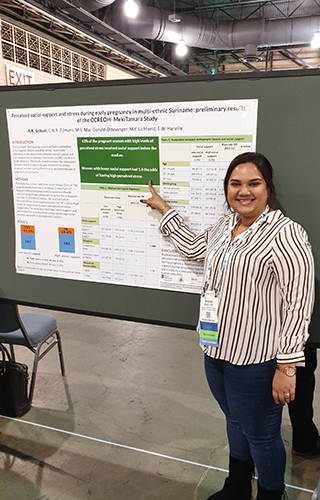By Anisma Gokoel

I am a native of Suriname and was raised in district Nickerie, the country's major rice-producing region, as part of the fourth generation of descendants of Eastern Indian immigrants. My interest in research started as an undergraduate in health sciences, policy, and management in health care at the Erasmus University Rotterdam, the Netherlands. I was awarded a grant to work as a research assistant on a review article about using robots to intervene in monitoring Type 2 diabetes in young children. I later had the opportunity to work as a student assistant at the Center for Healthcare Management (CMDz) on a project to strengthen Surinamese healthcare. After completing my master's degree in health care management, I was hired as researcher at the Academic Hospital Paramaribo in Suriname.
As a researcher at the Academic Hospital, I have worked on several quality-of-care improvement projects, including reducing waiting times at out-patient clinics and evaluating employee and patient satisfaction. I have also collaborated on multiple scientific research projects, such as avoidable hospitalizations in Suriname, alcohol, drug-use and road traffic injuries in the emergency department, substitution of health care from the primary to the secondary line, snakebites in Suriname, and COVID-19 mortality.
Working on these projects only increased my motivation to advance in research, which was noticed by Wilco Zijlmans, M.D., Ph.D., and Professor Maureen Lichtveld, M.D., M.P.H., project investigators of the Caribbean Consortium for Research in Environmental and Occupational Health (CCREOH) funded by the Fogarty international Center and National Institute of environmental Health Sciences. They granted me a scholarship in CCREOH's doctoral program, and I joined the CCREOH study.
This study follows an environmental epidemiology cohort of mother-child pairs to assess the impact of exposures to neurotoxicants - including selected pesticides, mercury, lead, cadmium, aluminum, iron, manganese, selenium, and tin - on maternal and child health in Suriname, while preserving the unique assets, health, and cultural traditions of indigenous and other health-disparate populations.
The CCREOH study has been conducted in Suriname, a middle-income country on the northeastern coast of South America. It's called the greenest country on earth with approximately 93% forest cover. In the country, mercury is used to separate gold from soil in artisanal and small-scale goldmining. Since the 1980s, this goldmining has been increasing in Suriname. High levels of mercury, above internationally accepted safety levels, were identified in hair of women and children living in Suriname.
During my Ph.D. studies, I focused on the influence of chemical and non-chemical stressors on birth outcomes among participants in the CCREOH study.
As part of my dissertation, I conducted fieldwork, recruiting participants from primary care prenatal health clinics (Regional Health Services) and from obstetrics/gynecology departments across all hospitals in Suriname. My recruiting included follow-up of the enrolled participants through the end of their pregnancy. I then administered neurodevelopmental tests for the children at one year of age.
This enriching field work experience brought me closer to our target population, gave me a better understanding of their cultural dynamics, and provided an opportunity to experience how these dynamics play a role in the recruitment and follow-up process. Because of my motivation and hard work to reach our target of 800 participants in the capital of Paramaribo and surrounding areas, I was asked to coordinate study recruitment in Paramaribo and Nickerie. As a local study coordinator, I developed an excellent relationship with the recruiters, some of whom I trained myself.
One of the main findings of my doctoral study was an association between hair mercury levels in the mothers and preterm birth . I also found that women experiencing higher levels of stress were at greater risk of delivering a low birthweight child. These findings sparked my curiosity to examine how a mixture of heavy metals influenced the neurodevelopment of Surinamese children. I received a UJMT Fogarty Global Health fellowship , where my aim was to investigate the influence of prenatal exposure to mercury, lead, and cadmium and depression and stress of the mother on the child's behavior using the Child Behavior Checklist questionnaire. We recently received metal exposure data from the majority of the mothers enrolled in the CCREOH study and are preparing a manuscript for publication. Working on public health and environmental health research as a born-and-raised resident of Suriname and experiencing the value of fieldwork as the CCREOH program study coordinator has provided a unique opportunity to develop myself personally and professionally.
In the future, I hope to apply for funding to broaden the scope of this study by examining other modulating factors influencing childhood behavior, including gene-environment interactions and other epigenetic factors given the racial and ethnic diversity of the population in Suriname.


